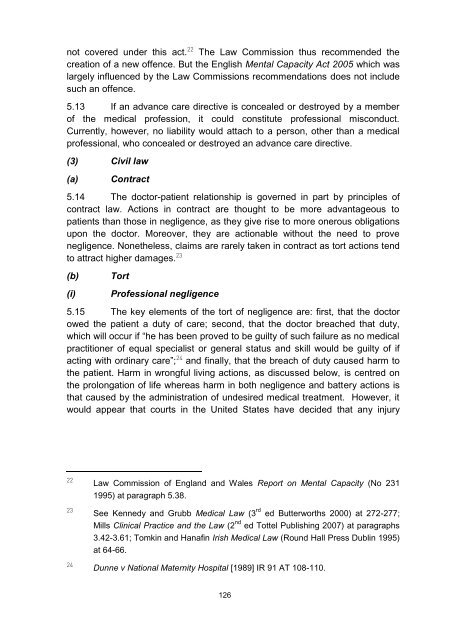Consultation Paper on Bioethics - Law Reform Commission
Consultation Paper on Bioethics - Law Reform Commission
Consultation Paper on Bioethics - Law Reform Commission
Create successful ePaper yourself
Turn your PDF publications into a flip-book with our unique Google optimized e-Paper software.
not covered under this act. 22 The <strong>Law</strong> Commissi<strong>on</strong> thus recommended the<br />
creati<strong>on</strong> of a new offence. But the English Mental Capacity Act 2005 which was<br />
largely influenced by the <strong>Law</strong> Commissi<strong>on</strong>s recommendati<strong>on</strong>s does not include<br />
such an offence.<br />
5.13 If an advance care directive is c<strong>on</strong>cealed or destroyed by a member<br />
of the medical professi<strong>on</strong>, it could c<strong>on</strong>stitute professi<strong>on</strong>al misc<strong>on</strong>duct.<br />
Currently, however, no liability would attach to a pers<strong>on</strong>, other than a medical<br />
professi<strong>on</strong>al, who c<strong>on</strong>cealed or destroyed an advance care directive.<br />
(3) Civil law<br />
(a) C<strong>on</strong>tract<br />
5.14 The doctor-patient relati<strong>on</strong>ship is governed in part by principles of<br />
c<strong>on</strong>tract law. Acti<strong>on</strong>s in c<strong>on</strong>tract are thought to be more advantageous to<br />
patients than those in negligence, as they give rise to more <strong>on</strong>erous obligati<strong>on</strong>s<br />
up<strong>on</strong> the doctor. Moreover, they are acti<strong>on</strong>able without the need to prove<br />
negligence. N<strong>on</strong>etheless, claims are rarely taken in c<strong>on</strong>tract as tort acti<strong>on</strong>s tend<br />
to attract higher damages. 23<br />
(b) Tort<br />
(i) Professi<strong>on</strong>al negligence<br />
5.15 The key elements of the tort of negligence are: first, that the doctor<br />
owed the patient a duty of care; sec<strong>on</strong>d, that the doctor breached that duty,<br />
which will occur if “he has been proved to be guilty of such failure as no medical<br />
practiti<strong>on</strong>er of equal specialist or general status and skill would be guilty of if<br />
acting with ordinary care”; 24 and finally, that the breach of duty caused harm to<br />
the patient. Harm in wr<strong>on</strong>gful living acti<strong>on</strong>s, as discussed below, is centred <strong>on</strong><br />
the prol<strong>on</strong>gati<strong>on</strong> of life whereas harm in both negligence and battery acti<strong>on</strong>s is<br />
that caused by the administrati<strong>on</strong> of undesired medical treatment. However, it<br />
would appear that courts in the United States have decided that any injury<br />
22 <strong>Law</strong> Commissi<strong>on</strong> of England and Wales Report <strong>on</strong> Mental Capacity (No 231<br />
1995) at paragraph 5.38.<br />
23 See Kennedy and Grubb Medical <strong>Law</strong> (3 rd ed Butterworths 2000) at 272-277;<br />
Mills Clinical Practice and the <strong>Law</strong> (2 nd ed Tottel Publishing 2007) at paragraphs<br />
3.42-3.61; Tomkin and Hanafin Irish Medical <strong>Law</strong> (Round Hall Press Dublin 1995)<br />
at 64-66.<br />
24 Dunne v Nati<strong>on</strong>al Maternity Hospital [1989] IR 91 AT 108-110.<br />
126

















